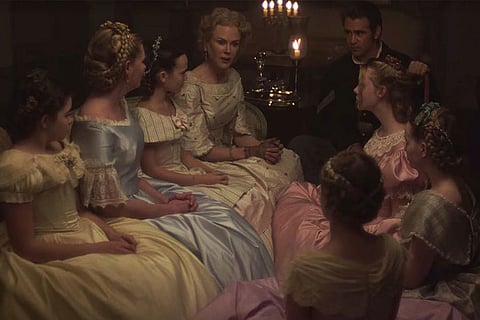
- Reviews
- Power List 2024
- Cannes 2024
- In-Depth Stories
- Web Stories
- News
- FC Lists
- Interviews
- Features
- FC SpecialsFC Specials

The screening of Nos Années Folles (Golden Years; French), by André Téchiné, started late, but the grumbling quietened when the reason was made known. The director and a few of his famous actors were making it to the theatre. What's a half-hour when you're seated three rows behind Juliette Binoche, Emmanuelle Béart and Catherine Deneuve? Before the film, a retrospective was shown, with clips from dramas like Wild Reeds, Being 17 and My Favourite Season. Could this reminder of genius be the reason the new film — the story of a World War I deserter named Paul (Pierre Deladonchamps) who disguises himself as a woman named Suzanne to avoid arrest — seemed underwhelming?
Just as cinema seems to have exhausted every narrative possibility with men in drag, we get a new dimension. One, Paul's wife, Louise (Céline Sallette), is complicit in the deception. And two, Paul begins to enjoy life as Suzanne. He loves Louise to bits and can't keep his hands off her. But when dressed as Suzanne, he seeks out men. For money. When Louise brings the subject up, he snaps, "I like what I do. Don't judge me. Don't call me a whore." But the hetero-to-bi transition isn't explained, and the result is bloodless. Superb performances, though, and the most amazing thing is that the film is based on a true story. Stranger than fiction, et cetera.
***
Jacques Doillon's Rodin stars Vincent Lindon as the sculptor and a portion of this biopic goes over his relationship with Camille Claudel (Izïa Higelin), which has been immortalised on screen by Bruno Nuytten, with Gérard Depardieu and Isabelle Adjani. You have to have something up your sleeve to match up to that movie (not to mention that star wattage) – Rodin has none. "I love you furiously, Camille," Rodin exclaims. We sense little of that fury. As for the sculpting, it's undeniably interesting to see the recreation of a master at work. (Rodin says the hierarchy of materials is gold, bronze, stone, clay. But he's made clay the most precious.) But we don't feel what Rodin does on seeing a sculpture dance with life, its dimpled, rippling flesh "kneaded by caresses and kisses." We want great art. We get words.
***
Sofia Coppola has a delicate sensibility that works beautifully in "plotless" films like Lost in Translation and Somewhere, and at least part of the anticipation for The Beguiled was about how this director would handle all this… plot. The film tells the story of a wounded Yankee soldier, John McBurney (Colin Farrell), who takes refuge in Miss Martha's (Nicole Kidman) school for young women. It's a Freudian fairy tale with a touch of feminism and southern Gothic horror: a Big Bad Id-Wolf set loose amidst sexually repressed women, who unleash their hell-hath-no-fury when he begins to sink his teeth (and other body parts) into them.
The film begins, appropriately enough, in thick fairy-tale woods, where little Red Riding… sorry Amy (Oona Laurence) stumbles on the soldier. She gives him a shoulder, and they hobble back to the school. She introduces him as Corporal John McBurney. Miss Martha (Nicole Kidman), who runs the place, coolly says, "He's not going to be here long enough for his name to make a difference to any of us." What a festival Kidman is having. After her superb turn in The Killing of a Sacred Deer, she knocks another one out of the park. Watch her undress McBurney and cleanse him with water and trepidation. She takes his hand and keeps it on hers, as though trying it on for size. Some of this is possibly Coppola's direction, but Kidman takes us right inside Miss Martha with the incisiveness of an X-Ray machine.
Meanwhile, others mill around — Edwina (an excellent Kirsten Dunst), Alicia (Elle Fanning) – intrigued by the presence of this man. This story was put on screen by Don Siegel earlier (the same year he made Dirty Harry!), with Clint Eastwood in one of his most uncharacteristic roles. (This actor as an unstoppable sex machine. Go figure.) The luridness of that version is enormous fun, but Coppola's love for the languid steers her in a very different direction. Where Siegel showed, Coppola suggests. And she displays hitherto unseen dimensions of her talent. Two dinner-table scenes are spectacularly funny, and the film builds tension with Hitchcockian sureness. The film is a bit of an oddity, but the mood Coppola orchestrates leaves you… beguiled.
***
Payal Kapadia's Afternoon Clouds — the sole Indian film, a 13-minute short, selected to play at Cannes – is about two women, a 60-year-old widow, Kaki, and her Nepali domestic help, Malti. It's also about a plant that flowers but once a year, and the bloom that lasts just a few days. It's about transience, impermanence. When Malti gently chides Kaki for wanting a spicy meal, Kaki says, "Why do I take so many medicines? For my next life?" It's about the moment.
Even the relationships come with an expiry date. Kaki's husband, of course, is no more. And Malti's maybe-boyfriend appears with the surreality of a dream. Maybe he is one. His name, after all, is Sapan, an anagram of sapna, Hindi for dream. For all you know, he may no longer be around when Malti wakes up – if, that is, she is asleep. The film plays out like a series of sketches, interspersed with paintings. When Kaki speaks of her husband, we see these paintings, or a tube light outside the flat, or a fluttering curtain. There's a lovely nothingness to the enterprise, in which the banal becomes quite beautiful.
Watch the trailer of Rodin here